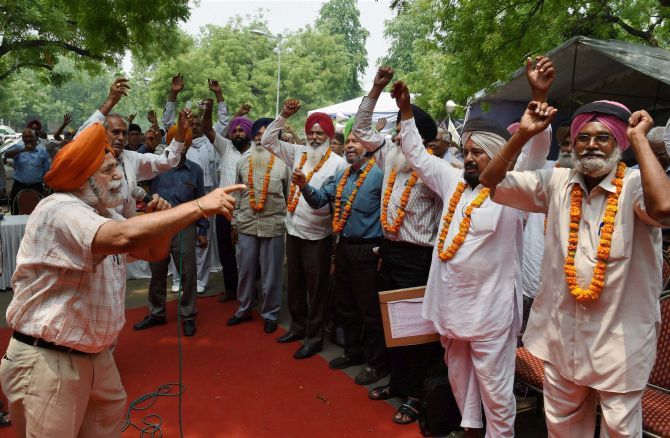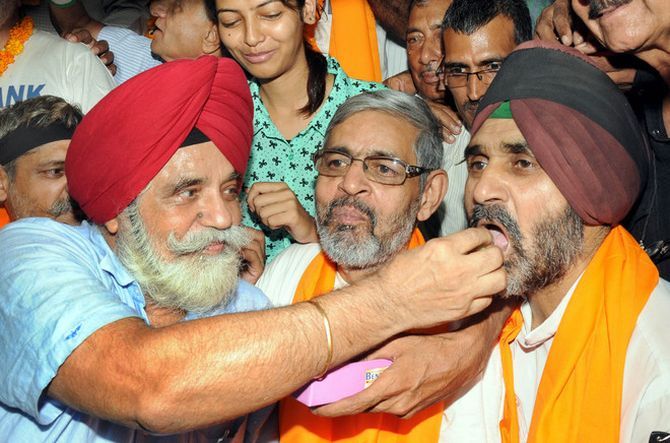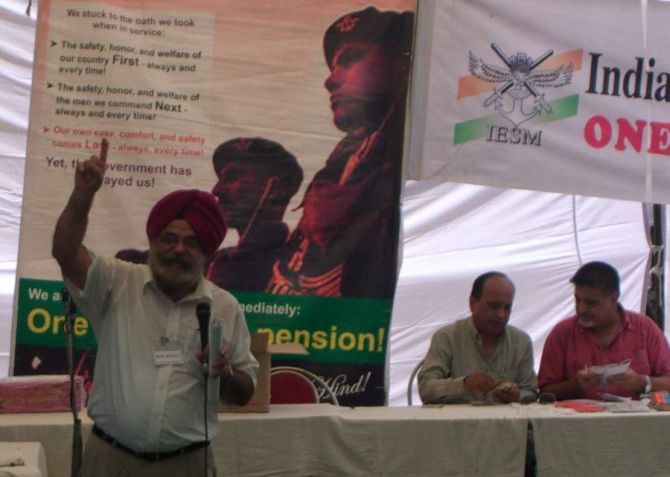'Think about this: A widow of a jawan is drawing only Rs 3,500. If OROP is implemented, she will get additional Rs 1,500. These poor girls are young and have no source of income; they are trying their best to just make ends meet. It is the pain of these situations that has driven me to this.'
'We don't want to put pressure on the government -- that's not our intention. We have full faith in our prime minister. We are asking for a meeting with him, and when we get that, we are sure he will not only give us what we are asking for, but 10 per cent extra.'
Major General Satbir Singh, who headed the OROP agitation at Jantar Mantar, speaks out.

Major General Satbir Singh SM (retd) has been one of the key leaders of the movement of ex-servicemen demanding One Rank One Pension.
The general is vice-chairman of the Indian Ex-Servicemen Movement that is spearheading the agitation of ex-servicemen at Jantar Mantar that forced the Union government to concede the demand for OROP.
General Singh, who served in the Indian Army for 36 years, spoke to Insiyah Vahanvaty for Rediff.com on why he has employed guards for his protection, how a senior leader of the OROP movement was robbed and threatened last week, and why the ex-servicemen won't believe the government.
We have been hearing reports about senior servicemen facing police harassment. Is this true?
One of our very senior members, Lieutenant General Lalji, was attacked on October 25. He had gone to Kotdwar (Uttarakhand) for an ex-servicemen's meeting and returned home at 8 pm. His house was locked.
When the door was opened he found his wife as well as all domestic help held captive by two armed boys.
Lalji was asked whether he campaigned for OROP. The gunmen then asked if acche din had arrived. Luckily, the couple had the presence of mind to stay calm and address the boys as beta.
The men ransacked the house, taking Rs 5,000 in cash and whatever jewellery they could find. They then poured two bottles of petrol on the carpet at the feet of the tied couple, threatening to set them on fire.
They then kidnapped their adopted daughter, threatening to kill her if the police was informed before 11 am the next day. The girl returned in an autorickshaw at 7 am. It is not yet known if she was sexually assaulted.
Now, was this an act to threaten veterans who are campaigning for OROP, or was it a dacoity? If it was a robbery, why did they ask Lieutenant General Lalji if he protesting for OROP? I am aghast that this news hasn't been all over the TV channels.
Look at the shamelessness of this country that they keep running a story about a murder of a girl by her mother, which is a 5-year-old story, but not showing the murderous attack on a senior ex-serviceman!
Is this country a banana country, where anyone who raises his voice against unjust practices should be wiped off the map?
In Dadri, the father of one of our serving officers was killed. Is this also an act committed because of our fight for OROP? What are the police doing?
Who is safe under this government? Should we be afraid simply because we are fighting for our rights?
Have you faced any harassment yourself?
My vehicle has been photographed by the police. Some people came to Jantar Mantar and left a threatening message for me while I wasn't there. They said they would do away with me. I don't want to speculate on who they were, but it is important to talk about it.
One day I was followed by a man on a motorcycle. From then on, we have adopted measures to keep ourselves safe. I make sure I never travel alone. I keep a licensed weapon with myself and have two guards stationed outside my home 24/7.
But the question is what are the government and police doing? I have to pay 20,000 rupees from my pension for guards to do a job that the government should be doing. Shame on them!
It's a shocking state of affairs in this country! Do they want the army and police to clash with each other? It will be a very dangerous situation in the country if that happens.
Are currently serving officers extending any assistance?
They live in the cantonment and cannot provide us with constant patrols. But every serving general should put pressure on the government, for the safety of their homes and ours. The Chief of Army should also take some responsibility. But more than any of this, we demand that the government give us answers.
Why would anyone join the army, live such a hard life, protecting the country if the country cannot even protect his wife and kids?
Can you tell us about the letter written in blood to the PM?
It's a letter written to the PMO, sent on October 26, signed in blood by almost 200 veterans, myself included. It is a letter expressing our grievances as OROP has not yet been implemented. There have been only delays and dilutions.
We are quite demoralised that we haven't been given our due, and not even been granted a meeting with the PM. We also want to address the fact that the morale of currently serving officers is very low, as they can see their future at Jantar Mantar.
Do you still have faith in the government?
Look, at the moment, we have no faith. All these pronuncements are only working towards shifting goal posts, while the people in power have only been mistreating and downgrading us.
Tell us about your time in the army.
All my life, even as a child, I had dreamt of a life in uniform. I come from a long line of men who have served in the army. My forefathers fought in the Sikh war of the 1800s. Though my father was an engineer, he joined the Territorial Army. So, as the eldest son, it was a no-brainer for me.
When I turned 16, I applied to the National Defence Academy in June 1962. I was commissioned in the Indian Army in June 1966. My time in the army was excellent. I feel it gave me an opportunity to grow.
Of all the combat I have seen in my life, the 1971 war with Pakistan was the bloodiest. It was also the most traumatic for my family. The first list of fallen soldiers that came out on December 7 had my name on it by mistake. I was only married for 10 months, so imagine the condition at home.
I was unaware of all this while fighting in Poonch. After five days, I found out about this terrible mistake and after a lot of effort managed to call my family.
What have you been doing since retirement?
After I hung my uniform in 2003, having served for more than 36 years, I realised that options were limited. I felt it would be most viable to find something where I could continue using my knowledge of security paradigms. So I worked as an examiner of PhD thesis for security studies at the Punjab University, Patiala.
Then I started feeling the discontent of how the country treats its soldiers. That's when I decided to step in and see what I could do to help the soldiers get their due.
If you look at the numbers, they are staggering. There are 45 lakh (4.5 million) ex-servicemen, and 6.45 lakh (645,000) widows.
So when the Sixth Pay Commission report came out in 2008, we found there was a lot that had been missed out on. That's when a few of us got together to start an organisation called Indian Ex-Servicemen Movement.
Is that how the One Rank One Pension agitation started?
Yes, and within a few days when it spread across the country, we realised that there is a lot of discontent. The issue we had raised was resonating with the rank and file in the villages. 70 per cent of the serving military in India are our children of ex-servicemen. We started our movement on April 27, 2008.
It was the first time we went out on the streets and made our point. Our numbers were in the thousands, and we held our protests at Gurgaon and Noida. The next meeting was a month later, and from then on, there has been no looking back.
The movement has really grown; not only in India, but also other countries where our ex-servicemen are -- Canada, US, Australia... They are also in touch with us; when they come here, they join us in our efforts.
OROP is a long overdue demand. Till 1973, it was being applied, but then was withdrawn due to reasons best known to those who made this decision. The demand picked up steam around the late 1970s. (Then prime minister) Indira Gandhi was about to grant OROP, but then unfortunately, she was assassinated. So things were relegated to the backburner again.
Since then, whenever we raked up the issue, some announcements were made to placate us, but OROP was not granted. Finally, we decided we had to agitate in a peaceful dignified manner, which has worked to an extent. The government has announced OROP, but there are still a few points that need to be ironed out.

How did the movement gain momentum?
We used social media efficiently and effectively. We used the resources we had to get whatever media coverage we could. The funding is all personal -- officers and ex-servicemen contribute to the cause and we spend their money very frugally.
Right now, we have enough money to make sure the agitation won't have to be shut down due to lack of funds.
We also used our personal contacts as much as possible so the movement may gain momentum. Especially in villages, people come out in solidarity. We have people from all over the country here at Jantar Mantar right now. And the protest is befitting the respect of a soldier -- we are not a union, shouting slogans and disrupting anything -- it is a peaceful and dignified protest that soldiers would not be reluctant to join.
How many people were you to start with?
We were about 27 people at the first meeting at my residence. We pooled in Rs 10,000 each from our pensions to take care of expenditure. And look what a long way we have come from there -- our movement is a nationwide one now.
We take up individual cases as well. We have dealt with 46,000 such cases. It is not a small number. And this doesn't include healthcare and education cases. So when you ask about building momentum, things like this spread like wildfire. People hear about it and feel inspired to join you.
What have been the hurdles and struggles you have faced as an organisation?
First of all, the opinion that soldiers should not be on the streets, protesting. We had to explain that we are also human beings and there is nothing shameful about protesting for our rights. It is a hard thing to fight because it is mostly in people's heads, but we persevered.
The second issue we faced was that the families of jawans and junior officers who have been martyred, were reluctant to come and join us. They felt they had too much on their plates already to get involved.
Then there were politicians and media people who said derogatory things about us, comparing us to striking unions. Arre, we are not sitting here for a few rupees from you -- we are sitting here because you have deprived us and denied us.
Why is the agitation still on despite assurances that OROP will be implemented?
Though the government has agreed to grant us OROP, their version is a diluted one. There are five key issues that have not yet been addressed.
Firstly, whenever there is a change/increase in the rates of pension, it must be automatically passed to the past pensioners. That means the current pension should immediately be given to past pensioners as well. The government is not agreeing to this. They say they will review and equalise pensions every five years.
In those five years, a whole lot of seniors will be drawing less than their juniors. That is not right. Pension revision needs to be done every year, not once in five years.
Second, they have detailed a one man commission to resolve this issue within the timeframe of six months. We cannot wait six months to get a letter. We have proposed a five member committee -- of which three should be veterans and a timeframe of one month.
Third, we had agreed on the date of March 31, 2014 as the date of implementation of OROP between us and the government in our meeting with the principal secretary. But in their notification, they have changed 'financial year' (of 2013-2014) to 'calendar year' (of 2013) which will effectively deprive us of one full year's increment. This is not the way!
Fourthly, they are saying that anyone who has opted for voluntary retirement will not be eligible for OROP. We don't have voluntary retirement in the army; we have something called PMR -- Pre-Mature Retirement. Of course, there have been clarifications offered by the prime minister, but yet there are doubts in our minds. We are not convinced about what they are saying.
And lastly, we had specified that we want pensions to be calculated at the top salary brackets, but they want to calculate the average. Which again means that people who retire later will lose out.
Why? If you are giving something, give it with grace. We are not asking for dole. Pensions have been defined by the Supreme Court as payment for a job already done. This is not dole, it is our right. And it has been denied to us for a long time.
Think about this: A widow of a jawan is drawing only Rs 3,500. If OROP is implemented, she will get additional Rs 1,500. These poor girls are young and have no source of income; they are trying their best to just make ends meet.
It is the pain of these situations that has driven me to this. A soldier has to make many sacrifices -- in my own service of 36 years, I only spent 7, 8 years at home with my family. A jawan who serves for 17 years only gets 1.8 years on an average to stay with his family.
The Officer Training Institute has reported that 40 per cent of vacancies have not been filled. It means people don't want to join the army. How can there be operational readiness without optimum strength?
We have no faith in the way things are progressing. They have been cheating us, scheming with commas and full stops. We want everything clarified and only then will we stop the agitation.

What do you feel is going to happen going forward?
We don't want to put pressure on the government -- that's not our intention. We have full faith in our prime minister. We are asking for a meeting with him, and when we get that, we are sure he will not only give us what we are asking for, but 10 per cent extra.
May it happen soon so we can get back to our homes with our children and grandchildren. We do not want to be on the road. A country that does not respect its soldiers is doomed to fail.
Have you had a meeting with him so far?
No. I've asked five times, but he has not granted me one. I don't know why.
Have you met any representative sent on behalf of the PM?
No.
Yet, you believe in his intentions?
See, in my heart, I do want to believe. But after all these efforts, nothing has been done; that's not fair. There has been a change in the 'kathni and 'karni' (In what you say and what you do).'
What does your family think about this path you have chosen?
My wife does not approve. She feels that nothing is going to come of our agitation, and that we will not be granted justice. But that is her view. My son, who is a colonel himself, says, "Papa, you know best." My two daughters feel that what I am doing is right and support me in it.
But my wife, to whom I am supposed to give much more time, feels the lack of it. I often miss important things like giving her insulin injections (she is diabetic). She is very understanding about those times, but often makes statements like, 'It's not worth it.'










